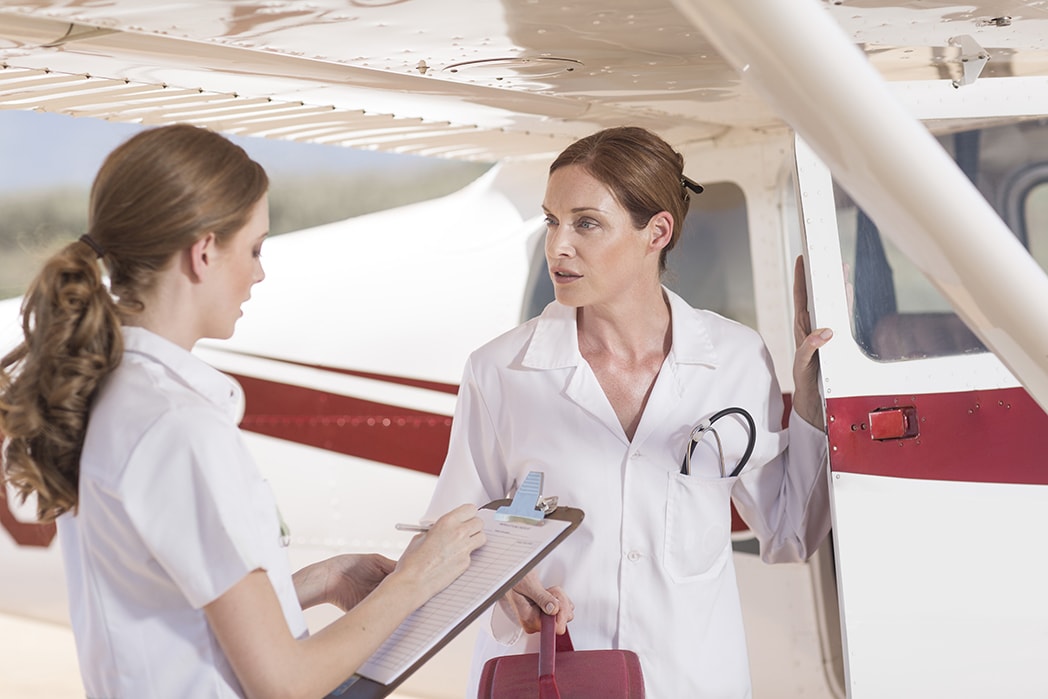Top Tips for Passing Your Pilots Medical Exam
Jul 09, 2025
Need to pass your pilots medical exam? It’s required to meet FAA health standards and fly. This article covers medical certificates, Aviation Medical Examiners and health requirements. Read on to learn how to prepare and pass.
Key Takeaways
-
FAA medical certificates are necessary for pilot fitness and safety, with three types: First-Class for airline transport, Second-Class for commercial and Third-Class for private.
-
Pilots must meet strict health standards for vision, hearing, mental health and cardiovascular conditions which are evaluated by Aviation Medical Examiners during the medical exam.
-
To stay certified you need regular check-ups, a healthy lifestyle and understanding of FAA rules on medication and renewal procedures to stay compliant.
Understanding FAA Medical Certificates
FAA medical certificates are the foundation of aviation safety. They determine if a pilot is fit to fly and if health issues won’t compromise flight operations. Taking and passing the FAA medical exam is the first step toward obtaining one of these certificates. There are three types of medical certificates issued by the FAA:
-
First-Class: For airline transport pilots, the most stringent health standards.
-
Second-Class: For other types of flying (not specified in the text).
-
Third-Class: For private pilots and hobbyists.
Your flying goals and requirements to be a pilot will determine which one you need.
BasicMed adds another layer to the certification process, allowing pilots to fly with Third-Class privileges without a traditional medical certificate.
This is great for pilots who meet the criteria, more flexibility while still meeting safety standards.
But career pilots can’t fly under BasicMed so you need to choose the right path based on your flying goals.
First-Class Medical Certificate
Aspiring airline pilots must meet the First-Class Medical requirements, which are essential for obtaining an airline transport pilot certificate, and include:
-
20/20 in each eye for distance vision critical for navigation and safety.
-
For those over 50 20/40 intermediate vision is also required.
-
ECG test at pilot’s age 35 and annually after 40 for an airline pilot.
First-Class Medicals are renewed frequently especially for pilots over 40 who need to renew every 6 months to stay active.
This ensures pilots are at the highest health standard for the demanding environment of commercial aviation. Meeting these requirements shows a pilot’s commitment to safety and operational excellence.
Second-Class Medical Certificate
Commercial pilots for a Second-Class Medical must also meet high health standards but less stringent than first class medicals. They require 20/20 distant vision for flight operations.
This medical is valid for 1 year for commercial activities after which it must be renewed to continue flying under commercial privileges.
Third-Class Medical Certificate
For private pilots and aviation enthusiasts, the Third-Class Medical is a middle ground between strict health requirements and accessibility. Pilots need to have 20/40 vision in each eye, with or without correction, to meet the standards for three or more pilots.
This is usually for flying for personal reasons or as a hobby, so it’s common for non-commercial pilots and those getting a sport pilot certificate.
BasicMed
BasicMed is an alternative way to fly with Third-Class medical privileges without a traditional medical certificate. To maintain BasicMed certification, pilots must take an online basicmed medical education course every 24 months and have a physical exam every 48 months.
It’s more flexible for recreational flying, but not for career pilots. For more info, the BasicMed Guide is a great resource.
The Role of Aviation Medical Examiners (AMEs)

Aviation Medical Examiners (AMEs) are physicians authorized by the FAA to do medicals and issue pilot medical certificates. They have training in aviation medicine so they understand the unique health challenges pilots face.
To become an AME you need a U.S. medical license and specialized training in aviation medicine. They ensure pilots meet health standards by doing various types of medicals including First-Class, Second-Class and Third-Class medicals.
Communication with your AME is key, especially if you have any health changes. Keeping your AME up to date and informed about FAA medical regulations and medical information will help you stay compliant and avoid complications.
Honesty on medical applications is critical because if you falsify information you can lose your medical. A good AME can help manage medical issues while you retain flying privileges.
Key Health Standards for Pilots

Pilot health standards are strict to protect the pilot and the public. The FAA says these standards cover:
-
Vision
-
Hearing
-
Mental health
-
Cardiovascular health
-
General medical conditions
Aviation Medical Examiners check all these during a pilot’s medical exam to make sure you meet the requirements for your medical certificate. These health standards are a core part of the overall pilot criteria used to determine fitness to fly.
There are several vision and hearing standards to make sure pilots have the necessary senses for safe flying.
The federal aviation administration also has guidelines on medications, some over the counter drugs can impair flight capabilities which may be checked during a flight physical.
Meeting these health standards is required to get and keep your FAA medical.
Vision Requirements
Vision standards are key to pilot safety and operational capability. For a First-Class Medical Certificate, you need 20/20 distant vision in each eye, with or without correction. Second-Class is the same 20/20 vision but with 20/40 near vision requirements.
Third-Class is 20/40 vision in each eye, again with or without correction. These standards ensure you have the visual acuity for safe flight.
Hearing and ENT Standards
Hearing standards are just as important. You must be able to hear a conversational voice at 6 feet, with or without a hearing aid. This means you can communicate and stay situational aware during flight and contribute to overall aviation safety.
Mental Health Standards
Mental health is a big part of the medical evaluation. You must disclose any previous psychosis or bipolar disorder. You must also disclose any severe personality disorders and any history of personality disorder. These standards ensure you are mentally fit to fly and therefore safe for yourself and your passengers.
Cardiovascular Health
Cardiovascular health is another big one. The FAA requires specific evaluations for pilots with heart issues, including:
-
Within 90 days of identification of heart issues: personal and family medical history and clinical exam.
-
For First-Class Medical Certificate: ECG at age 35 and annually thereafter.
-
Hypertension and coronary heart disease are generally disqualifying.
-
Pilots can fly with a waiver if they meet specific health criteria, including flight physicals.
Hypertension is defined by the FAA as a systolic blood pressure over 155 mmHg or diastolic pressure over 95 mmHg.
Acceptable treatments include several classes of antihypertensive medication so pilots can manage their condition and remain safe. These are big ones for pilots with cardiovascular concerns.
General Medical Conditions
Managing general medical conditions like diabetes is key to getting certified. If you need insulin you will need to provide a full medical history and current evaluation.
Once you get special issuance you will need to monitor your blood sugar before and during flight to ensure safety.
These standards show how important it is to manage chronic conditions to get clinically significant medical certification.
Special Issuance Authorizations
Special issuance allows pilots with initially disqualifying medical conditions to get a medical certificate and medical clearance and medical clearances if certain criteria is met. This process usually involves:
-
Submitting medical documentation to a review board.
-
Considering conditions like hypertension and sleep apnea for special issuance.
-
Allowing you to fly under close monitoring.
In complex or borderline cases, the final decision may rest with the Federal Air Surgeon, who has the authority to approve or deny certification based on medical risk and aviation safety.
Talking to an aviation medical examiner or legal document expert can be helpful in navigating this process.
Medication Use and FAA Policies
The FAA has strict rules on medication use for safety of flight. Any medication that affects faculties against safety or acts on the central nervous system is generally prohibited. Medication use can disqualify you if it causes a medical deficiency so pilots need to know what medications are allowed.
Before reporting medication use pilots should contact AOPA to avoid medical application delays and to make sure they have the right FAA form. This proactive approach will help pilots manage their health without losing their medical.
Knowing these rules is key to compliance and safe flight operations and flight safety.
Medical Certificate Renewal and Expiration
Medical certificates have different renewal periods based on class and age. For example, a Third-Class Medical Certificate is good for 60 months for pilots under 40, but only 24 months for those 40 and over.
A Second-Class Medical Certificate allows for commercial flying for 12 months and private flying for 48 months after commercial privileges expire.
Renewing a medical certificate involves:
-
Apply through FAA MedXPress.
-
Book an appointment with a local AME.
-
Gather all medical records and documentation before reapplying, especially if you’ve been previously disqualified.
Medical privileges begin the month after the pilot is examined.
What Happens if You Fail Your Medical Exam?
Failing a medical exam is not the end of the world. Pilots should talk to an AME or aviation lawyer to understand their options. Special issuance medical certificates are an option for pilots with disqualifying conditions to continue flying.
While under review, pilots can still fly as long as they are not pilot-in-command.
Knowing the difference between a deferral and a denial is key, as a deferral means further review, while a denial means non-compliance with medical standards.
Tips for Maintaining Your Medical Certification
Keeping your medical involves:
-
Regular health checks to address medical issues before they impact your medical status
-
Exercise regularly
-
Eat well These are the medical standards you need to meet.
Mental health is important too. Keeping your mental health good will help you meet medical requirements for long term certification. These will help you overall and meet the FAA’s strict health standards.
Summary
Flying the FAA medical certification minefield is a must for any pilot. Knowing the different types of medical certificates, the role of AMEs and the health standards will help you pass the medical.
Regular health checks, a healthy lifestyle and staying up to date with FAA rules are key to long term certification. Remember your health and safety come first and meeting these standards means you can keep flying.
Frequently Asked Questions
What are the vision requirements for a First-Class Medical Certificate?
To get a First Class Medical you need 20/20 vision in each eye with or without correction. This is for optimal visual acuity for safe flying.
Can I use a hearing aid to meet the hearing requirements for certification?
Yes, you can use a hearing aid to meet the hearing requirements for certification, provided that you can hear a conversational voice at a distance of 6 feet.
What should I do if I fail my medical exam?
If you fail your medical it’s a good idea to talk to an aviation medical examiner or an aviation lawyer to discuss options such as a special issuance medical certificate.
This will help you understand what to do next and what your options are.
How often do I need to renew my First-Class Medical Certificate if I am over 40?
If you are over 40, you must renew your First-Class Medical Certificate every 6 months.
What is BasicMed, and who can use it?
BasicMed is a program that allows pilots to fly with a Third Class medical without a traditional medical certificate but it’s not for career pilots. So recreational and private pilots who meet the eligibility criteria can use this option.
